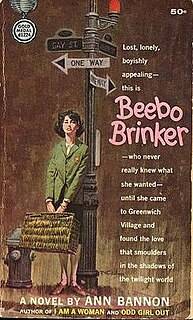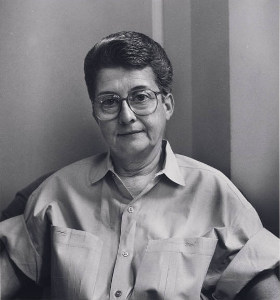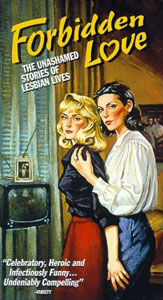
Lesbian pulp fiction is a genre of lesbian literature that refers to any mid-20th century paperback novel or pulp magazine with overtly lesbian themes and content. Lesbian pulp fiction was published in the 1950s and 60s by many of the same paperback publishing houses as other genres of fiction including westerns, romances, and detective fiction. Because very little other literature was available for and about lesbians at this time, quite often these books were the only reference the public had for modeling what lesbians were. Stephanie Foote, from the University of Illinois commented on the importance of lesbian pulp novels to the lesbian identity prior to the rise of organized feminism: "Pulps have been understood as signs of a secret history of readers, and they have been valued because they have been read. The more they are read, the more they are valued, and the more they are read, the closer the relationship between the very act of circulation and reading and the construction of a lesbian community becomes...Characters use the reading of novels as a way to understand that they are not alone."

The Ladder was the first nationally distributed lesbian publication in the United States. It was published monthly from 1956 to 1970, and once every other month in 1971 and 1972. It was the primary publication and method of communication for the Daughters of Bilitis (DOB), the first lesbian organization in the US. It was supported by ONE, Inc. and the Mattachine Society, with whom the DOB retained friendly relations. The name of the magazine was derived from the artwork on its first cover, simple line drawings showing figures moving towards a ladder that disappeared into the clouds.

Ann Weldy, better known by her pen name Ann Bannon, is an American author who, from 1957 to 1962, wrote six lesbian pulp fiction novels known as The Beebo Brinker Chronicles. The books' enduring popularity and impact on lesbian identity has earned her the title "Queen of Lesbian Pulp Fiction". Bannon was a young housewife trying to address her own issues of sexuality when she was inspired to write her first novel. Her subsequent books featured four characters who reappeared throughout the series, including her eponymous heroine, Beebo Brinker, who came to embody the archetype of a butch lesbian. The majority of her characters mirrored people she knew, but their stories reflected a life she did not feel she was able to live. Despite her traditional upbringing and role in married life, her novels defied conventions for romance stories and depictions of lesbians by addressing complex homosexual relationships.
Naiad Press was one of the first publishing companies dedicated to lesbian literature. At its closing it was the oldest and largest lesbian/feminist publisher in the world.

The page is about the novelist and poet. For the diver and shark expert see Ron & Valerie Taylor

Marijane Meaker is an American writer who, along with Tereska Torres, is credited with launching the lesbian pulp fiction genre, the only accessible novels on that theme in the 1950’s.

Lesbian literature is a subgenre of literature addressing lesbian themes. It includes poetry, plays, fiction addressing lesbian characters, and non-fiction about lesbian-interest topics.

Spring Fire, is a 1952 paperback novel written by Marijane Meaker, under the pseudonym "Vin Packer". It is the first lesbian paperback novel, and the beginning of the lesbian pulp fiction genre; it also addresses issues of conformity in 1950s American society. The novel tells the story of Susan "Mitch" Mitchell, an awkward, lonely freshman at a Midwestern college who falls in love with Leda, her popular but troubled sorority sister. Published by Gold Medal Books, Spring Fire sold 1.5 million copies through at least three printings.

I Am a Woman is a lesbian pulp fiction novel written in 1959 by Ann Bannon. It is the second in a series of pulp fiction novels that eventually came to be known as The Beebo Brinker Chronicles. It was originally published in 1959 by Gold Medal Books, again in 1983 by Naiad Press, and again in 2002 by Cleis Press.

Women in the Shadows is a lesbian pulp fiction novel written in 1959 by Ann Bannon. It is the third in a series of pulp fiction novels that eventually came to be known as The Beebo Brinker Chronicles. It was originally published in 1959 by Gold Medal Books, again in 1983 by Naiad Press, and again in 2002 by Cleis Press. Each edition was adorned with a different cover.

Journey to a Woman is a lesbian pulp fiction novel written in 1960 by Ann Bannon. It is the fifth in a series of pulp fiction novels that eventually came to be known as The Beebo Brinker Chronicles. It was originally published in 1960 by Gold Medal Books, again in 1983 by Naiad Press, and again in 2003 by Cleis Press. Each edition was adorned with a different cover.

Beebo Brinker is a lesbian pulp fiction novel written in 1962 by Ann Bannon. It is the last in a series of pulp fiction novels that eventually came to be known as The Beebo Brinker Chronicles. It was originally published in 1962 by Gold Medal Books, again in 1983 by Naiad Press, and again in 2001 by Cleis Press. Each edition was adorned with a different cover. Although this is the last in the series, it is set first — a prequel to the others. In the order of the series, it follows Journey to a Woman. However, in the order of the events and characters in the series, Beebo Brinker takes place several years before Odd Girl Out does.

Barbara Grier was an American writer and publisher. She is credited for having built the lesbian book industry. After editing The Ladder magazine, published by the lesbian civil rights group Daughters of Bilitis, she co-founded a lesbian book-publishing company Naiad Press, which achieved publicity and became the world's largest publisher of lesbian books. She built a major collection of lesbian literature, catalogued with detailed indexing of topics.

Forbidden Love: The Unashamed Stories of Lesbian Lives is a 1992 Canadian documentary film about the lives of lesbians and their experiences of lesbian pulp fiction. The film presents the stories of lesbians whose desire for community led them on a search for the few public beer parlours or bars that would tolerate openly queer women in the 1950s and 60s in Canada. It was written and directed by Lynne Fernie and Aerlyn Weissman and featured author Ann Bannon. It premiered at the 1992 Toronto Festival of Festivals and was released in the United States on 4 August 1993. It was produced by Studio D, the women's studio of the National Film Board of Canada.
Karin Kallmaker is an American author of lesbian fiction whose works also include those originally written under the name Laura Adams. Her writings span lesbian romance, lesbian erotica, and lesbian science-fiction/fantasy. Dubbed the Queen of Lesbian Romance, she publishes exclusively in the lesbian market as a matter of personal choice.
Elaine Williams was an American lesbian pulp fiction author and editor of the late 1950s and early 1960s. She wrote under a pseudonym, largely either as Sloan Britton or Sloane Britain.
Yvonne Christine MacManus was an American novelist specializing in lesbian fiction and science fiction. Although she used her real name when writing in other genres, MacManus published lesbian fiction under the pseudonym Paula Christian.
Julie Ellis was an early lesbian pulp fiction author of the 1960s, writing pro-lesbian romance and erotica under varied pseudonyms for Midwood-Tower Publications. She changed her writing pseudonyms and legal name usage numerous times and later in life she wrote historical and romance fiction under the name Julie Ellis.

Sally M. Singer is an American writer who penned lesbian pulp fiction from the late 1950s through the mid-1970s. She is most well known for her works which she wrote under the pseudonyms March Hastings and Laura Duchamp, mostly for Midwood-Tower Publications. Some of these works include Three Women, The Third Theme, and Duet.

The Girls in 3-B is a classic work of lesbian pulp fiction by Valerie Taylor which was published in 1959 by Fawcett. Its happy ending for a lesbian character was unusual for the time period. It was one of the first three novels of any pulp fiction genre to be reprinted in 2003 by Feminist Press.
















